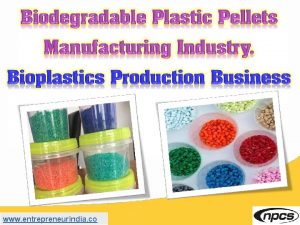
Biodegradable Plastic Pellets Manufacturing Industry. Bioplastics Production Business
Biodegradable plastics are plastics that can be decomposed by the action of living organisms, usually microbes, into water, carbon dioxide, and biomass. Biodegradable plastics are commonly produced with renewable raw materials, micro-organisms, petrochemicals, or combinations of all three. But it turns out that the promise of biodegradable plastic may be too good to be true. In theory, biodegradable plastics degrade faster than regular plastics because they contain additives that attract microbes to decompose them. Bioplastics are plastic materials produced from reanewable biomass sources, such as vegetable fats and oils, corn starch, straw, woodchips, sawdust, recycled food waste, etc.
Biodegradable plastics are those that can be degraded by microbial action to produce natural end products, like water and carbon dioxide, in a reasonable period of time. The time needed to decompose completely depends on the material, environmental conditions such as temperature and moisture,
There are two kinds of biobased polysters: polylactide acid (PLA) and polyhydroxyalkanoate (PHA).
Uses:
- Biodegradable plastics offer reduces carbon dioxide levels.
- Biodegradable plastics are broken down by naturally-occurring bacteria. Biodegradable plastics can reduce greenhouse gas emission levels.
- Biodegradable plastics do not release other dangerous items upon decomposition.
- Biodegradable plastics consume less energy during the manufacturing cycle.
- Biodegradable plastics reduce the amount of waste we produce.
- Biodegradable plastics would direct petroleum consumption to other needs.
- Biodegradable plastics can mix with traditional products.
- Biodegradable plastics require less energy during the manufacturing cycle.
- Biodegradable plastics could create new export industries.
- Biodegradable plastics create a new marketing platform.
- Biodegradable plastics can decompose quickly in specific situations.
Market Outlook
The global bioplastics for packaging market valuation of more than $4 billion in 2017 and is expected to reach a value of $15.6bn by the end of 2027 while experiencing a robust CAGR of 14.4% during the period 2017-2027. Gains will be driven by escalating costs for petroleum-based resins and growing initiatives that favor renewable resources. Polyester-based and polylactic acid resins will grow the fastest, while starch-based types remain the largest segment.
Drivers for the Bioplastics Market Growth in India
A number of key drivers are accelerating the growth of the bioplastics market globally. Many of these are relevant in the Indian context too.
- Mandates & regulations
- Increasing eco-awareness among consumers
- Corporates becoming more focused on sustainability
- Technology stabilization
- Cost reduction
- Biodegradable Plastic Packaging Market
The transition to a low-carbon and circular economy, stronger policy support for the bioeconomy, and increased consumer awareness for sustainable products and packaging are driving the expansion of the market. Expected to create huge growth opportunities for the manufacturers of biodegradable plastics in the next five years. The demand for biodegradable plastics is witnessing a significant rise from conventional end-user industries, such as packaging, agriculture, and textile.
The use of biodegradable plastics, especially in the European countries, is also increasing in other niche segments, such as medical implants and drug delivery systems, etc. these factors are driving the overall market’s growth. North America is expected to lead the market with the highest market value and the fastest market growth of 14.6% during the forecast period However, Asia Pacific Excluding Japan (AJEP) is also progressing and is expected to project a high CAGR during the period of assessment.
With increasing concerns over the use of plastics, sustainable alternatives to plastics are increasingly in demand. Biopolymers in general and bioplastics in particular, present one such sustainable alternative. In this context, bioplastics have attained prominence as they are one of the few scalable and commercially feasible alternatives to a wide range of plastics. Products and solutions based on bioplastics/biopolymers present interesting opportunities globally. Opportunities are present across a variety of industrial sectors that include packaging, water, beverages, insulation materials, specialty materials and more.
The key factor driving the bioplastics market is the need for more eco-friendly and less polluting materials. Other drivers include volatile fossil fuel prices and the need for companies to decrease their carbon footprint across their entire business value chain. The demand for bioplastics has been gradually increasing due to its renewability and availability of raw material, advanced functionality and technical properties, and the recycling options at least some of them present.
Key players
Tetra Pak International SA, Plastic Suppliers Inc., Kruger Inc. NatureWorks (US), Braskem (Brazil), Novamont (Italy), BASF (Germany), Total Corbion PLA (Netherlands), Biome Bioplastics (UK), Bio-On (Italy), Toray Industries (Japan), Plantic Technologies (Australia), and Mitsubishi Chemical Corporation (Japan).
See more